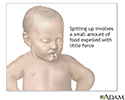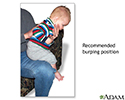Spitting up - self-care
Spitting up is common with babies. Babies may spit up when they burp or with their drool. Spitting up should not cause your baby any distress. Most often babies stop spitting up when they are about 7 to 12 months old.
Why Babies Spit up
Your baby is spitting up because:
- The muscle at the top of your baby's stomach may not be fully developed. So baby's stomach cannot hold in milk.
- The valve at the bottom of the stomach may be too tight. So the stomach gets too full and milk comes out.
- Your baby may drink too much milk too fast, and take in a lot of air in the process. These air bubbles fill up the stomach and milk comes out.
- Overfeeding causes your baby to get too full. So milk comes up.
Spitting up is often not due to a formula intolerance or an allergy to something in the nursing mother's diet.
Spitting up is Often Normal
If your baby is healthy, happy, and growing well, you don't need to worry. Babies that are growing well often gain at least 6 ounces (170 grams) a week and have wet diapers at least every 6 hours.
How to Reduce Spitting up
To reduce spitting up you can:
- Burp your baby several times during and after feeding. To do so sit the baby upright with your hand supporting the head. Let the baby lean forward slightly, bending at the waist. Gently pat your baby's back. (Burping your baby over your shoulder puts pressure on the stomach. This might cause more spitting up.)
- Try nursing with just one breast per feeding while breastfeeding.
- Feed smaller amounts of formula more frequently. Avoid large amounts at one time. Be sure that the hole in the nipple is not too large while bottle feeding.
- Hold your baby upright for 15 to 30 minutes after feeding.
- Avoid a lot of movement during and immediately after feeding.
- Slightly elevate the head of babies' cribs so babies can sleep with their heads slightly up.
- Talk to your baby's health care provider about trying a different formula or removing certain foods from the mother's diet (often cow's milk).
When to Call the Doctor
If your baby's spit up is forceful, call your baby's provider. You want to make sure your baby does not have pyloric stenosis, a problem where the valve at the bottom of the stomach is too tight and needs to be fixed.
References
Khan S, Orenstein SR. Gastroesophageal reflux disease. In: Kliegman RM, Stanton BF, St. Geme JW, Schor NF, eds. Nelson Textbook of Pediatrics . 20th ed. Philadelphia, PA: Elsevier; 2016:chap 323.
Liacouras CA. Normal digestive tract phenomena. In: Kliegman RM, Stanton BF, St. Geme JW, Schor NF, eds. Nelson Textbook of Pediatrics . 20th ed. Philadelphia, PA: Elsevier; 2016:chap 305.
U.S. Food & Drug Administration. Babies spitting up-Normal in most cases. Updated April 22, 2016. www.fda.gov/ForConsumers/ConsumerUpdates/ucm363693.htm . Accessed September 30, 2016.
-
Spitting up - illustration
Spitting up is common and occurs frequently during infancy. Spitting up does not indicate a problem unless the baby is choking on the food, or is spitting up excessively large amounts of food.
Spitting up
illustration
-
Baby burping position - illustration
To reduce spitting up, burp the baby several times during and after feeding. One technique is to sit the baby upright, with your hand supporting the head. Let the baby lean over slightly, bending at the waist. The upright posture moves air to the top of the stomach, and the forward lean puts a little pressure on the stomach to eject the air, helping the baby to burp.
Baby burping position
illustration
-
Baby spitting up - illustration
Babies commonly spit up since the sphincter at the top of the stomach is often loose. In healthy babies who are growing well, the spit-up is mostly milk, rather than stomach acid. On average spitting up peaks at 4 months and is over by about 7 months of age, though it can take longer. To help reduce spitting up, burp the baby several times during and after feeding.
Baby spitting up
illustration
-
Spitting up - illustration
Spitting up is common and occurs frequently during infancy. Spitting up does not indicate a problem unless the baby is choking on the food, or is spitting up excessively large amounts of food.
Spitting up
illustration
-
Baby burping position - illustration
To reduce spitting up, burp the baby several times during and after feeding. One technique is to sit the baby upright, with your hand supporting the head. Let the baby lean over slightly, bending at the waist. The upright posture moves air to the top of the stomach, and the forward lean puts a little pressure on the stomach to eject the air, helping the baby to burp.
Baby burping position
illustration
-
Baby spitting up - illustration
Babies commonly spit up since the sphincter at the top of the stomach is often loose. In healthy babies who are growing well, the spit-up is mostly milk, rather than stomach acid. On average spitting up peaks at 4 months and is over by about 7 months of age, though it can take longer. To help reduce spitting up, burp the baby several times during and after feeding.
Baby spitting up
illustration
Review Date: 8/31/2016
Reviewed By: Neil K. Kaneshiro, MD, MHA, Clinical Assistant Professor of Pediatrics, University of Washington School of Medicine, Seattle, WA. Also reviewed by David Zieve, MD, MHA, Isla Ogilvie, PhD, and the A.D.A.M. Editorial team.



